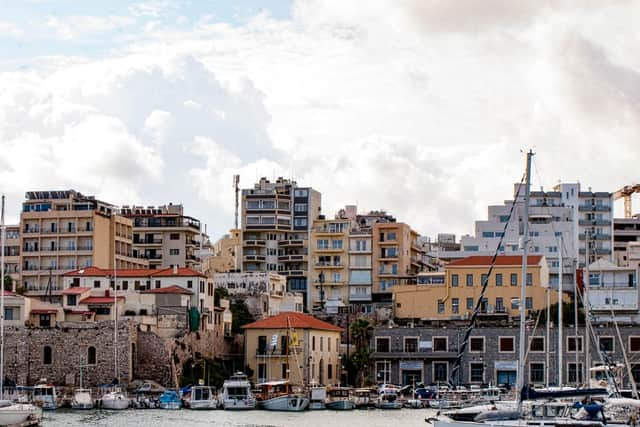Earthquake in Crete: What damage did it cause and are earthquakes more common in Greece?
and live on Freeview channel 276
A 6.0 magnitude earthquake hit Crete, an island in Greece on October 27th at 9.17am.
Reports are still unfolding as to the extend of the damage, as aftershocks continued to be felt throughout Crete.
Advertisement
Hide AdAdvertisement
Hide AdHere’s what we know so far about the earthquake in Crete, including how severe the damage is.
How much damage did the earthquake in Crete today do?
One man was killed when the dome of a church fell in and several others have been injured, as older buildings were hit with serious damage.
Schools and hospitals have already been evacuated to check for structural damage.


A state of emergency has been declared in the region surrounding Heraklion.
Advertisement
Hide AdAdvertisement
Hide AdHolidaymakers on Twitter also report that evacuations are being carried out in case a second major earthquake should reach Crete.
The epicentre of the earthquake was 16 miles south of the city of Heraklion, with a depth of 6.2 miles.
After the initial 6.0 magnitude earthquake, a series of aftershocks were also felt, reaching up to 4.6 magnitude.
For context, a 5.3 magnitude earthquake is considered moderate and a 6.3 is a strong one, according to the United States Geological Survey.
Advertisement
Hide AdAdvertisement
Hide AdAccording to the European Mediterranean Seismological Centre (EMSC), feeling aftershocks just after an earthquake is normal as the Earth’s crust needs to rebalance itself after the initial shock.
The presence of aftershocks does not make it any more likely for a second earthquake to be felt.
At the moment, damage seems limited to historical buildings, with some older buildings in Crete experiencing structural damage and village walls collapsing closer to the epicentre.
People who live in older buildings or previously damaged structures are being advised to stay outdoors, with 2,5000 tents being set up to house those who need it.
Advertisement
Hide AdAdvertisement
Hide AdThere have also been reports from Twitter users of cracks in paving slabs and minor damage to household objects like picture frames.
Are earthquakes common in Greece?
Greece is one of the most seismically active countries, due to its geographical position.
Greece and its islands are located along a boundary zone in the eastern Mediterranean, between the African Plate and the Eurasian Plate.
In mainland Greece, earthquakes up to seven in magnitude have been recorded in the past, rising to up to 7.2 in islands like Crete.
Advertisement
Hide AdAdvertisement
Hide AdBeing on fault lines makes it more likely for Greece to experience earthquakes, as tectonic plates shifting and moving against one another cause the tremors to be felt across the country and islands.
However, despite the likelihood of frequent earthquakes, the ones felt in Greece are often fairly small.
What’s more, Greek builders construct buildings designed to withstand earthquakes, meaning that Greek cities and towns are less likely to experience serious structural damage than in comparison to other cities, such as in Turkey and other Mediterranean countries.
How far is Crete from Kos?
Crete is the largest island in Greece with the largest population, located roughly 330 miles south-west of the island of Kos.
Advertisement
Hide AdAdvertisement
Hide AdRoughly 630,000 people live on the island and it’s also a popular tourist destination, meaning the hotels are currently housing lots of tourists and travellers at the moment.
Kos was another island to experience a serious earthquake back in 2017, due to its shared location with Crete along a series of fault lines.
A message from the Editor:
Thank you for reading this article. We're more reliant on your support than ever as the shift in consumer habits brought about by coronavirus impacts our advertisers.
If you haven't already, please consider supporting our trusted, fact-checked journalism by taking out a digital subscription.
Comment Guidelines
National World encourages reader discussion on our stories. User feedback, insights and back-and-forth exchanges add a rich layer of context to reporting. Please review our Community Guidelines before commenting.
